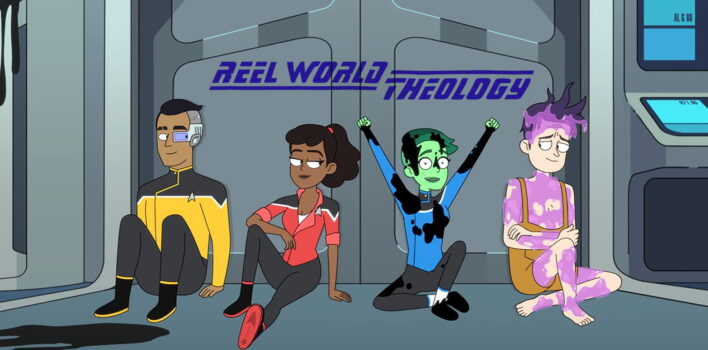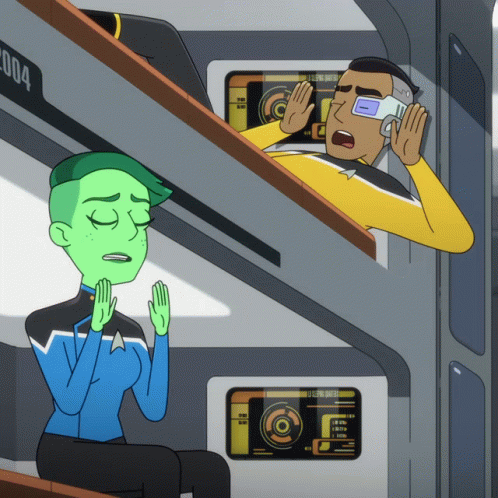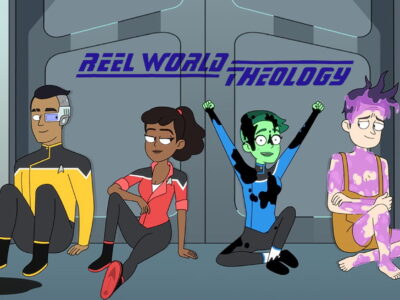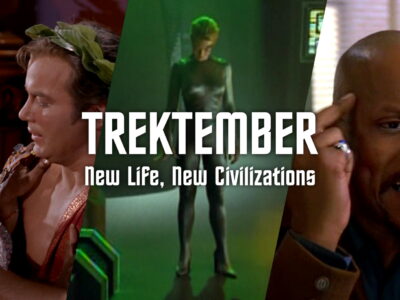“Cupid’s Errant Arrow” – Star Trek: Lower Decks S1E05
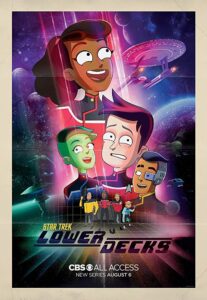 Find yourself someone who talks about you the way Tendi and Rutherford say “Whoosh.”
Find yourself someone who talks about you the way Tendi and Rutherford say “Whoosh.”
“Cupid’s Errant Arrow” is the first story I’ve felt fit within the duration of a Lower Decks episode thus far. While the other four entries into this season have suffered from a breakneck pace (and the leads’ dialogue in this episode still sounds like it’s sped up to about 1.25x), episode five is the first one where I felt like more interesting plot beats weren’t being left on the cutting room floor. The pacing is much better, actually utilizing the shorter format to tell a story that would probably have felt too thin within a classic Trek episode.
Plus, it features some of the better character work in the show yet, delivering some fascinating, endearing, even heartwarming characterization. When I saw Tawny Newsome in Space Force earlier this year on Netflix (side note: how is it that Newsome has left the planet twice in 2020 and I’m still stuck here? Rude), I was struck by her facility at switching between subtle and bombastic, but also at switching between tender and sardonic. As it turns out, she can do that in voice-over work, too.
And it delivers a tried-and-true sci-fi premise. Add that to the characterization, and while it didn’t quite reach the excellence of “Envoys” or “Moist Vessel,” it blew past the pilot by light years.
As you might’ve expected from the title, this episode is all about love. And while we’ve seen Rutherford and Tendi’s potentially-romantic love for one another (and for the Cerritos, and for science as a whole, and for Starfleet), we haven’t really seen Mariner show her affection for Boimler much yet. Here we revisit the spark of care we saw in “Envoys” as it catches flame.
Spoiler warning: plot and ending details for “Cupid’s Errant Arrow” follow.
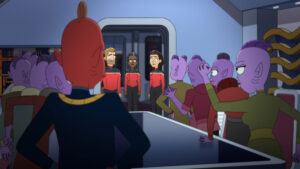 This episode is the first one of Lower Decks thus far (and one of only a handful throughout the franchise) to eschew the cold open in favor of just playing the theme song and jumping right in. And it uses that extra time to great effect, plugging in a delightful “C”-story about Captain Freeman mediating a sociopolitical and religious dispute between the inhabitants of the Mixtus system and…well, a natural disaster. The tone of the episode and the character of Carol Freeman allow for her to give a response to a stubborn alien dignitary we always wish Captain Picard could’ve tossed off, incredulously shouting at him and then giving the order to “implode the moon.” It’s a classic Trek plot, and even though it’s funny, it’s still a real and credible threat.
This episode is the first one of Lower Decks thus far (and one of only a handful throughout the franchise) to eschew the cold open in favor of just playing the theme song and jumping right in. And it uses that extra time to great effect, plugging in a delightful “C”-story about Captain Freeman mediating a sociopolitical and religious dispute between the inhabitants of the Mixtus system and…well, a natural disaster. The tone of the episode and the character of Carol Freeman allow for her to give a response to a stubborn alien dignitary we always wish Captain Picard could’ve tossed off, incredulously shouting at him and then giving the order to “implode the moon.” It’s a classic Trek plot, and even though it’s funny, it’s still a real and credible threat.
But the rest of this episode is about love—Rutherford and Tendi’s love for cool tech, the Vancouver, and (eventually) the Cerritos, of course; but even more so, Mariner’s platonic (?) love for Boimler, Boimler’s desperate love for Brinson, and Brinson’s inexplicable love for Boimler. This episode loves truly and deeply.
He is a dork, for sure…but he’s my dork.
 After five episodes, I have to say I’m not entirely convinced that Mariner doesn’t have a thing for Boimler. Every time it seems clear there’s nothing between them, something happens that makes me think she might have a little bit of a crush that she’s really ashamed of.
After five episodes, I have to say I’m not entirely convinced that Mariner doesn’t have a thing for Boimler. Every time it seems clear there’s nothing between them, something happens that makes me think she might have a little bit of a crush that she’s really ashamed of.
What I am convinced of is her love for him, romantic or not. Let’s face it: you don’t jump out of an airlock for someone if you don’t love them. Mariner is suspicious of Brinson from the first moment because she knows Boimler, and she knows that the relationship just doesn’t add up.
Her willingness to run herself ragged and make a fool of herself to protect her friend because she knows something’s wrong proves that it’s an honest love. That’s why I felt somewhat betrayed when Boimler insists that Mariner is just trying to sabotage the relationship, that she’s invented evidence to support her claim so that she doesn’t have to admit that she’s wrong: we know that she’s sincere, and she’s been showing it throughout the episode and the series.
And through her discussion with Brinson, we know that she’s not in the dark about who Boimler is; she isn’t seeing him through rose-colored glasses. She knows all of his faults and foibles, probably better than he does himself, and she cares for him anyway because they’ve been through a lot together; they’ve got so much in common that she can’t help loving him.
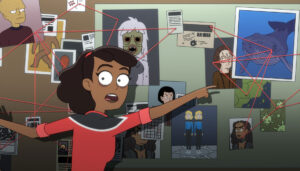 The love spurs her to action, to care, and eventually to the point of sacrifice. She jumps out of an airlock to save him, and doesn’t even think twice about it. True love is sacrificial, and she’s willing to risk death—whether by flying into an imploding moon or being killed by an evil parasite—if it means she could save her friend.
The love spurs her to action, to care, and eventually to the point of sacrifice. She jumps out of an airlock to save him, and doesn’t even think twice about it. True love is sacrificial, and she’s willing to risk death—whether by flying into an imploding moon or being killed by an evil parasite—if it means she could save her friend.
Maybe it’s platonic, and maybe not; either way, it’s a sincere, knowing, sacrificial love that’s both heartwarming and a good example.
Oh PLEASE stop saying “lover.”
Boimler and Brinson’s relationship, on the other hand, despite being comprised of two double-B names (Bradward Boimler, Barbara Brinson) is the true opposite of a healthy relationship. Brinson’s love isn’t real (driven as it is only by the parasite), Boimler’s isn’t sacrificial (he seems to truly only be in it for himself), and neither of them truly know the other.
Boimler doesn’t know about Brinson’s relationship with Jet, and doesn’t trust the two of them together. He sees and hears everything she does and says through the lens of mistrust because he doesn’t know who she really is and isn’t trying to learn. Bradward regularly talks about Barbara in terms of what she can do for him, rather than how they can both grow and be fulfilled in the relationship. He doesn’t know her or try to know her: it’s an unhealthy way to approach a relationship, and not a good example of love.
 Brinson doesn’t know about the parasite that has made her boyfriend irresistible to her. This may not really be her fault due to the parasite, but she also seems to have been carried away and lost a bit of herself during her relationship with Boimler. This may be extrapolation, but it seems like she is more herself after the pheromones wore off: she wanted to pursue her career, not pursue a relationship. She’s not interested in knowing herself and presenting her whole self in the relationship.
Brinson doesn’t know about the parasite that has made her boyfriend irresistible to her. This may not really be her fault due to the parasite, but she also seems to have been carried away and lost a bit of herself during her relationship with Boimler. This may be extrapolation, but it seems like she is more herself after the pheromones wore off: she wanted to pursue her career, not pursue a relationship. She’s not interested in knowing herself and presenting her whole self in the relationship.
And sure, both of these examples of ignorance could be chalked up to the fact that they haven’t been dating for very long, but they really seem perfectly pleased to just be around one another without actually learning about the other or themselves. It’s a bad sign.
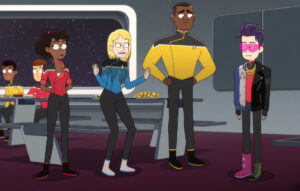 The relationship is doomed from the start, and Mariner is the only person who sees it. But it’s doomed because none of the pillars of a healthy relationship were present: rather than sincere, knowing, and sacrificial, it’s a false, blind, desperate love that is unfortunately pretty common in many interactions we have.
The relationship is doomed from the start, and Mariner is the only person who sees it. But it’s doomed because none of the pillars of a healthy relationship were present: rather than sincere, knowing, and sacrificial, it’s a false, blind, desperate love that is unfortunately pretty common in many interactions we have.
It’s a starship, not heaven!
Even though one of these relationships is a romantic one and the other is platonic, the comparison is still apt: humans were made to love deeply in sincerity, knowledge, and sacrifice. That’s why Mariner’s determination to save Boimler is so heartwarming: it’s an example of a friendship we’re wired to need at our very core.
…love one another earnestly from a pure heart, since you have been born again, not of perishable seed but of imperishable, through the living and abiding word of God…
—1 Peter 1:22-23, ESV
We always thank God, the Father of our Lord Jesus Christ, when we pray for you, since we heard of your faith in Christ Jesus and of the love that you have for all the saints, because of the hope laid up for you in heaven.
—Colossians 1:3-5, ESV
It’s wired into us by the One who created us, but it doesn’t come from inside of us and it isn’t something we can just work really hard at. In 1 Peter 1 and Colossians 1, the Apostles make clear that this love comes directly from Jesus: we only love because He first loved us sincerely, knowingly, and sacrificially. Because of that sacrifice, we have the ability to pass that love on to others: like Mariner showing love to Boimler because of their shared experiences, just much, much stronger.
We functionally forget this love every single day, and so we must continuously refresh our understanding of it by coming to God, coming to the scriptures, and feeling its warm glow on our face once more: He knows you. Think about what that entails; what all He would see that’s darker and more unflattering than the pretty public persona we show to everyone. He knows all of our darknesses. And yet He sincerely, sacrificially loves us anyway.


